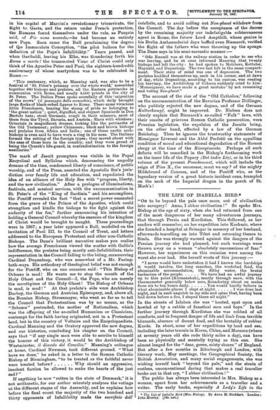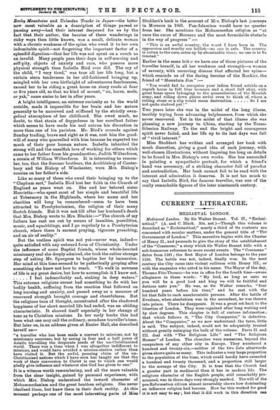THE LIFE OF ISABELLA BIRD.*
"On to be beyond the pale once more, out of civilisatioU into savagery ! Anna, I abhor civilisation !!' So spoke Mra. Bishop at the age of sixty, when she had returned from one of the most dangerous of her many adventurous journeye, that through Persia and Kurdistan. This 'followed, as her readers will remember, on her expedition into Kashmir, where she founded a hospital at Srinagar in memory of her husband, afterwards travelling on into Tibet and returning thence to Simla. She was strongly warned against the dangers of the Persian journey she had planned, but such warnings were thrown away on a woman "absolutely unconscious of fear." However, her experiences on this occasion were among the worst she ever had. She herself wrote of this journey " I never would have undertaken it had I known the hardships it would involve, the long marches, the wretched food, the abominable accommodation, the filthy water, the brutal
barbarism of the people We have had an awful journey up to title point (Kirmanshah), mostly through snow, with the thermometer generally below zero, floundering about on mules from six to ten hours daily You would hardly believe in what abominable places I slept at night I was done last
night, and in such anguish in nay side and spine that, having been laid down before a fire, I stayed there all night."
In the streets of Isfahan she was "hooted, spat upon and howled at by a rabble of fanatical men and boys." In the further journey through Kurdistan she was robbed of all comforts, and in frequent danger of life and limb from terrible blizzards, absence of decent food, and the brutality of robber Kurds. In short, none of her expeditions by land and sea, including the later travels in Korea, China, and Morocco (where at seventy years old she rode thirty miles a day), can have been so physically and mentally hying as this one. She almost longed for the "dear, green, misty shores" of England. But after a few months in Edinburgh and London, with literary work, May meetings, the Geographical Society, the British Association, and many social engagements, she was wishing herself back "beyond the pale," and the strain of restless, unconventional daring that makes a real traveller broke out in that cry, "I abhor civilisation ! "
The public has always been interested in Mrs. Bishop as a woman, apart from her achievements as a traveller and a writer. The early books, especially A Lady's Info in the *.Tho Life of Iiabellet Bird (Mrs Bishop). By Anna Si. Stoddart. -London John Murray. [113s. nut.] Booby Mountains and Uaireaten Tracks. ia Tapas —the latter now meet valuable as a description of things passed or passing away—had their interest deepened for us by the fact that their author, the heroine of these wanderings in risky ways then little known, was a small, delicate woman with a chronic weakness of the spine, who owed it to her own indomitable spirit—not forgetting the important factor of a splendid digestion—that her life was not spent on a couch as an invalid. Many people pass their days in self-nursing and self-pity, objects of anxiety and care, who possess more physical strength than Isabella Bird ever did. The my of the child, "I very tired," was true all her life long, but a certain stern tenderness in her old-fashioned bringing up, mingled with her own birthright of adventurous fearlessness, caused her to be riding a great horse on stony roads at four or five years old, so that no kind of mount, "ox, horse, mule, or yak," came amiss to her in after years.
A bright intelligence, an extreme curiosity as to the world outside, made it impossible for her brain and her nature generally to be narrowed and stiffened by the strictly evan- gelical atmosphere of her childhood. She owed much, no doubt, to that strain of doggedness in her excellent father tvhich seems to have made his zeal outrun his discretion in more than one of his parishes. Mr. Bird's crusade against Sunday trading, brave and right as it was, cost him the good- will of many who quarrelled with him because he expected too much of their poor human nature. Isabella inherited the strong will and the unselfish love of working for others which came to her father from his grandmother, Judith Wilberforce, a cousin of William Wilberforce. It is interesting to remem- ber, too, that the Sumner brothers, the Archbishop of Canter- bury and the Bishop of Winchester, were Mrs. Bishop's cousins on her father's side.
Like so many of those who owed their bringing up to the "Clapham sect," Isabella Bird lost her faith in the Church of England as years went on. She and her beloved sister Henrietta—who spent most of her simple and beautiful life at Tobermory in the Highlands, where her name and her charities will long be remembered—seem to have been attracted to Presbyterianism, the religion of their many Scotch friends. But it was not till after her husband's death that Mrs. Bishop wrote to Mrs. Blackie :—" The church of my fathers has east me out by means of inanities, puerilities, music, and squabbling,s, and I go regularly to a Presbyterian church, where there is earnest praying, vigorous preaching, and an air of reality."
But the restless spirit was not yet—never was, indeed— quite satisfied with any outward form of Christianity. Under the influence of some Baptist friends, whose whole-hearted missionary zeal she deeply admired, she took the rather strange step of asking Mr. Spurgeon to baptise her by immersion. Her mind at this time seemed to be pathetically groping after something she knew not how to reach. "To walk in newness of life is my great desire, but how to accomplish it I know not.
I feel indescribably sad, sinking in deep waters." This extreme religious unrest had something to do with her bodily health, suffering from the reaction that followed on long nursing and anxiety, and passed away as a measure of recovered strength brought courage and cheerfulness. But the religious turn of thought, accentuated after the shadowed happiness of her short married life had ended, was an abiding characteristic. It showed itself especially in her change of tone as to Christian missions. In her early books this had been what one may call the ordinary, mundane traveller's tone. But later on, in an address given at Exeter Hall, she described
herself as— "a traveller who has been made a convert to missions, not by missionary successes, but by seeing in four and a half years of Asiatic travelling the desperate needs of the un-Christianised werld. There was a time when I was altogether indifferent to missions, and would have avoided a mission-station rather than have visited it. But the awful, pressing claim of the un- Christianised nations which I have seen has taught use that the work of their conversion to Christ is one to which one would gladly give influence and whatever else God has given to one."
It is a witness worth remembering, and all the more valuable from the clear insight, gained by personal experience, with which Mrs. Bishop understood the inward character of Mohammedanism and the great heathen religions. She never idealised them, but knew them in their dark reality. At this moment perhaps one of the most interesting parts of Miss
Stoddart's book is the account of Mrs. Bishop's last journeys in Morocco in 1901. Pan-Islamism would have no quarter from her. She mentions the Mohammedan religion as "at once the curse of Morocco and the most formidable obstacle in the way of progress" :—
"This is an awful country, the worst I have been in. The oppression and cruelty are hellish—no one is safe. The country is rotten to the core, eaten up by abominable vices ; no one is to be trusted."
Earlier in the same lelt :r we have one of those pictures of the traveller herself, in all her weakness and strength—a woman of seventy, with recurring disease that affected her spine— which reminds us of the daring heroine of the Rockies, the friend of "Mountain Jim" "You would fail to recognise your infirm friend astride on a superb horse in full blue trousers and a short full skirt, with groat brass spurs belonging to the generalissimo of the Moorish army, and riding down places awful even to think of, where a rolling stone or a slip would mean destruction So I am not quite shelved yet !"
Two years later she was in the midst of the long illness, terribly trying from advancing helplessness, from which she never recovered. Yet in the midst of that illness she was planning a new journey to China, starting by the Trans- Siberian Railway. To the end the bright and courageous spirit never failed, and her life up to its last days was full of "vivid interest."
Miss Stoddart has written and arranged her book with much discretion, giving a good idea of each journey, with well-chosen illustrations, without lingering too long on details to be found in Mrs. Bishop's own works. She has succeeded in painting a sympathetic: portrait, for which a friend's band was necessary, of a striking character full of paradox and contradiction. Her book cannot fail to be read with the interest and admiration it deserves. It is not too much to say that Isabella Bird, the famous traveller, was one of the really remarkable figures of the later nineteenth century.























































 Previous page
Previous page